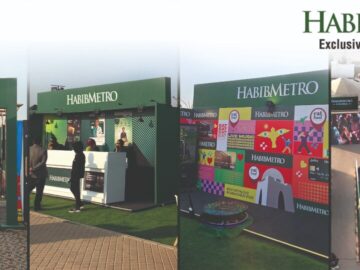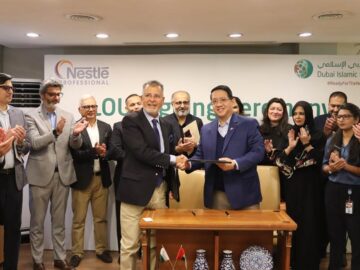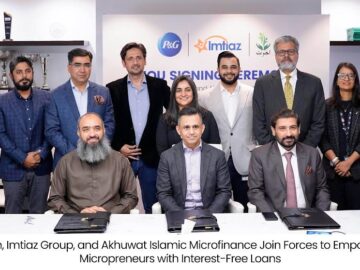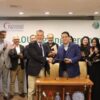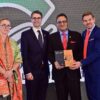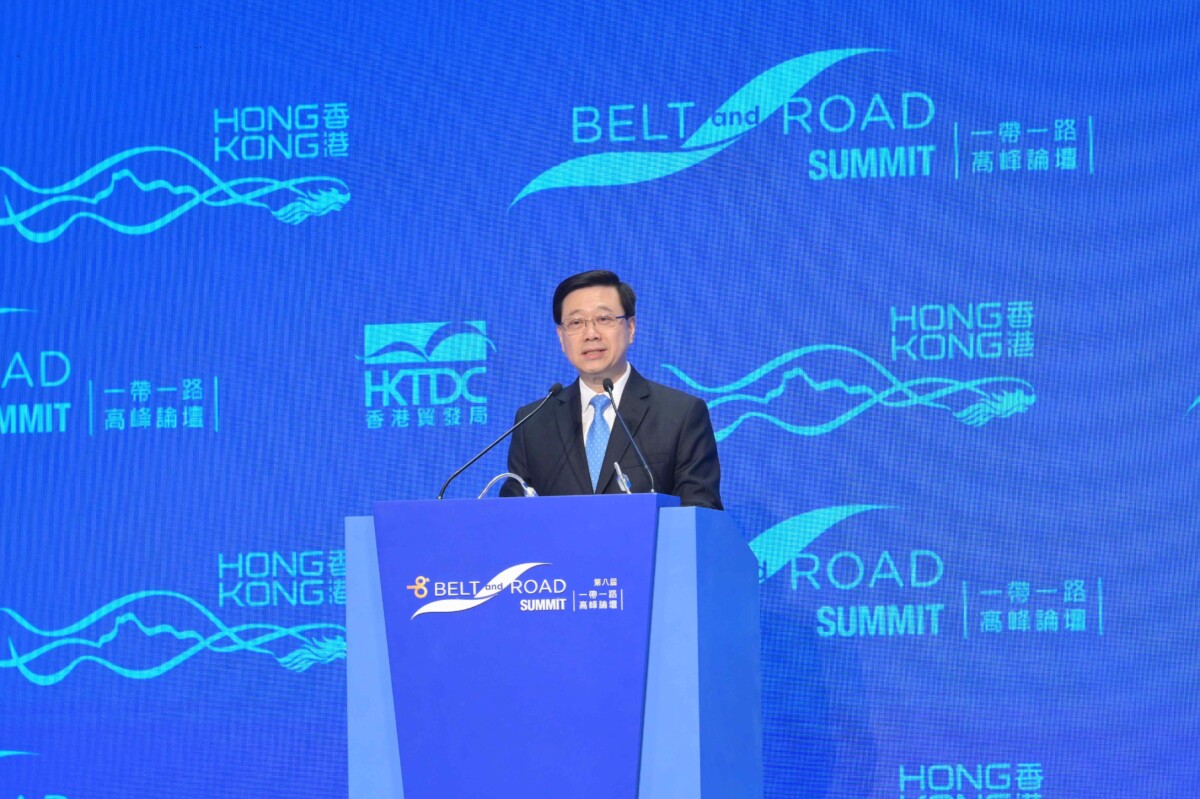
The eighth edition of the Belt and Road Summit, jointly organized by the Government of the Hong Kong Special Administrative Region (HKSAR) and the Hong Kong Trade Development Council (HKTDC), concluded after a successful two-day event at the Hong Kong Convention and Exhibition Centre (HKCEC).
Marking 10 years of the Belt and Road Initiative (BRI), the Summit brought together some 90 government officials and business leaders from more than 70 countries and regions along the Belt and Road. The event garnered significant attention, attracting some 6,000 participants from around the world.
An effective platform to showcase Hong Kong’s unique advantages, the Summit enjoys unwavering support from Mainland China and strong global connections. With Hong Kong as a gateway for foreign investment and a facilitator for global expansion, the event fostered connections with emerging markets and promoted the growth of emerging industries. This resulted in the signing of 21 memoranda of understanding (MoUs). The event also provided young leaders and start-ups with an opportunity to participate and share BRI opportunities and successes.
Charting emerging-market development
Under the theme Prospering on a Decade of Collaboration, this year’s Summit hosted multiple panel discussions and sessions to highlight emerging markets.
This includes policy dialogues and project investment sessions focused on the Middle East, which were complemented by business plenaries and thematic breakout sessions on a range of topics to reflect on the past 10 years of the BRI and explore future business and investment opportunities across industries.
The focus on the Middle East at the Summit followed high-level and industry-specific missions to the Middle East this year, including a high-level delegation led by Hong Kong SAR Chief Executive John Lee that visited Saudi Arabia and the United Arab Emirates (UAE).
The Summit’s first session, Policy Dialogue, hosted by Christopher Hui, Secretary for Financial Services and the Treasury of the Hong Kong SAR, invited heavyweight speakers to share their insights, focused on enhancing cooperation to promote investments, financial services, and development solutions between Belt and Road countries and the Middle East.
Speaking on the topic of Tapping into the Potential of the Middle East, Rania A. Al-Mashat, Minister of International Cooperation of Egypt, said: “Egypt and Mainland China have cooperated on trade infrastructure for a long time. The mainland has invested extensively in port and industrial-park infrastructure in the Suez Canal Economic Zone, including in manufacturing and technology projects. There is a fundamental overhaul in sustainable infrastructure and the global value chain, with developments in such areas as bunkering and logistics.”
Abdulla Bin Touq Al Marri, Minister of Economy of the UAE, also shared his views: “We want to switch ourselves from a linear to a circular economy, continually re-cycling resources,” Mr Al Marri said. One scheme the country was working on was “fry to fly,” where an industrial plant converted used cooking oil into aviation fuel. As with Hong Kong, both tourism and aviation were vital for the UAE, he said. Each sector accounted for 14% of UAE’s GDP so it was vital to ensure both became sustainable. As with Hong Kong and its membership of the Greater Bay Area, the UAE was developing manufacturing in the Middle East, planning industrial corridors with Bahrain and Jordan.”
Meanwhile, Fahd bin Abdulmohsan Al-Rasheed, Advisor in the General Secretariat of the Council of Ministers of Saudi Arabia, said: “All of Saudi Arabia was focused on the Vision 2030 project, an ambitious project to create a vibrant society and prosperous nation. A key part of Vision 2030 was the innovative city of NEOM, a technology-focused metropolis being built from scratch, stretching inland from the Red Sea coast in the northwest of the country. The Middle East and Saudi Arabia had a lot to contribute to the Belt and Road. The Red Sea, which runs along the Kingdom’s west coast, carried 30% of the world’s shipping.”
Debut Middle East Forum boosts synergy for BRI
The Middle East Forum made its debut on Day 2, 14 September, to reinforce the synergy of the BRI. A business session, featuring the Business and Investment Outlook in the Middle East Market, hosted by Ronnie C. Chan, Chairman of Hang Lung Properties Limited, invited distinguished guests, including Nicolas Aguzin, Chief Executive Officer of Hong Kong Exchanges and Clearing Limited; Maher Aboud, Group Chief Executive Officer of Ghassan Aboud Group, Ahmed Obaid Yousef Al Qaseer, Chief Executive Officer of the Sharjah Investment Development Authority; Hossam Heiba, President of the General Authority for Investment & Free Zones; and Walid Majdalani, Managing Director Corporate Investment for Middle East and North Africa of Investcorp, to analyze Middle Eastern market trade and investment prospects and further strengthen connections between Hong Kong and Middle Eastern countries.
Over 280 investment projects matched
The hybrid business matching and project pitching sessions at the Summit remained popular among project owners and participants. More than 280 investment projects from the Belt and Road region and beyond were presented, covering four main areas: (1) energy, natural resources, and public utilities; (2) innovation and technology; (3) urban development; and (4) transportation and logistics infrastructure. The projects focused on areas, such as smart city development, data centers, and e-commerce-related investments. Over 800 one-to-one business matching meetings were arranged for project owners, investors, and professional service providers to pave the way for collaboration agreements. New project-pitching sessions on the Middle East and emerging markets were also well received.
21 MoUs highlight strong connections with ASEAN
A total of 21 cooperation MoUs were signed, involving government bodies and companies from Hong Kong, Mainland China, and ASEAN countries, such as Malaysia, Vietnam, Indonesia, and Thailand. They covered renewable construction resources, sustainable energy, R&D, infrastructure, logistics, and more. Among them, MoUs signed with Bahrain, Saudi Arabia, and the United Arab Emirates to strengthen Hong Kong-Middle East ties.
Dedication to nurturing future pillars
The new Youth Chapter invited young business leaders and start-ups to share their insights on exploring and seizing Belt and Road opportunities. Some 150 recipients of the Belt and Road Scholarship, Youth Development Commission (YDC) Youth Ambassadors, and graduate students from various universities were invited to the Summit. YDC Youth Ambassadors presented a multimedia exhibition on the 10th anniversary of the BRI and provided simultaneous interpretation services for participants in one-on-one project match-making.
The following day, the 6th Belt and Road Global Forum Annual Roundtable will take place along with Belt and Road Week, share perspectives on Belt and Road collaborations, exchange the latest information, and seize cooperation opportunities.



